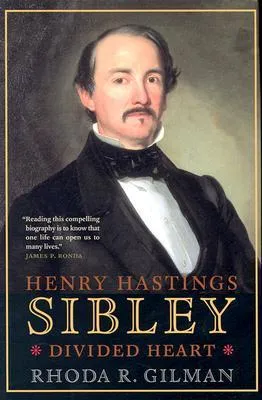Henry Hastings Sibley: Divided Heart
By (author): "Rhoda R. Gilman"
Publish Date:
April 2004
ISBN087351484X
ISBN139780873514842
AsinHenry Hastings Sibley: Divided Heart
Original titleHenry Hastings Sibley: Divided Heart
Congressman, governor, military leader, and senior statesman--no person played a longer, more influential, or more varied role in the shaping of Minnesota than Henry Hastings Sibley (1811-91). Yet Sibley's history reveals universal tensions about the duality of the nineteenth century frontiersman who is at once an accommodating trade partner of the Indian/European/Metis worlds and the conquering government official of the ever-expanding West. Rhoda Gilman has spent over thirty years examining Sibley--through hints and fragments of stories that Sibley himself left in articles, an unfinished autobiography, and scores of family letters--and uncovers in this perceptive and balanced biography the complexities of a man who embodied these clashing extremes. As Gilman writes in her preface,On the broader stage of national history Sibley's life spanned nineteenth-century America. Rooted in the political and social establishment of the old Northwest Territory, he witnessed the colonizing of a continent and its people, the closing of the frontier, the agony of civil war, and the explosive birth of an urban, industrial society. He was keenly conscious of what he conceived to be the nation?s destiny, and he identified closely with it. An heir to the Indian policy of Lewis Cass, who had managed to dispossess the Great Lakes tribes without war, Sibley belonged to the generation that was left to pay the price of that betrayal in blood and shame. And unlike Cass, he had personal ties to the Dakota people that placed him in a deeply ambiguous position. Gilman sets the controversial but altogether human Sibley against the tapestry of trade, politics, frontier expansion, and intercultural relations in the Upper Mississippi valley, and reminds us that throughout his life Sibley was poised to become a national figure but always chose to remain in the place he loved and had helped to name "Minnesota."
